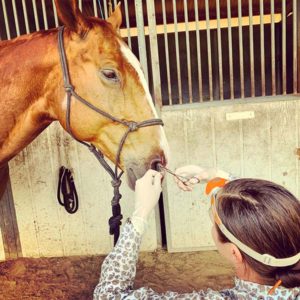When to Call the Vet
Has not had a checkup within the last year
Wellness care by your licensed veterinarian is integral to providing good quality of life for your healthy horse. Yearly checkups save you money in the long run by providing preventative care and early disease detection, allows your vet to know your horse when they are in good health, and affords the building of a quality relationship with your vet. The yearly exam also allows you to make the most out of your relationship with your horse’s personal vet; giving you the time to discuss any questions or concerns you might have, such as: nutrition, vaccine guarantees, hoof health, and much more.
Lame
Your horse should be able to stand squarely with its weight evenly distributed, be able to walk, trot, or canter freely on all types of surfaces, and be able to move his neck and head without hesitation. Even a subtle change in your horse’s movement should be evaluated by your vet promptly. A casual attitude toward illness and injury is a huge risk to take with something as precious as a horse.
Lying down/unusual behavior
Most horses lay down to rest for a period of time each day. It is considered an emergency when the resting horse becomes the down horse, or the horse is cast in such a way that it is unable to maneuver into a position where it can stand by itself. The down horse requires prompt veterinarian intervention to prevent progression of disease, irreversible muscle damage, cardiovascular compromise, respiratory difficulty, and undue stress.
Horses are creatures of habit, with their own set of regular routines and activity schedules throughout the day. Unusual behavior is considered anything out of the norm for your horse, and should be followed by a call to your vet as soon as possible. Behaviors such as excessive rolling, thrashing, looking at their flanks, pawing, or cat-like stretching warrant a call to your vet as soon as possible. This is not the time to walk your horse for hours throughout the night. Painful horses need expedient veterinary intervention.
Bleeding
Lacerations in horses can be mildly superficial to life threatening. A bleeding horse is considered an emergency, no matter how small the laceration is. Horses are exquisitely sensitive to tetanus and wound infections. This includes bleeding/trauma to the foot and frog. Do not wait to call your vet if you observe your horse bleeding.

Injured/Swollen
Injuries in horses have a wide range of manifestations. If you suspect your horse has sustained an injury, or has any swellings on his body or legs, please call your vet as soon as possible. This is not a time to take a, “wait and see” approach, because the horse is showing there is an urgent problem. For example, cellulitis can manifest as a single leg swelling that is hot and painful to the touch, as a result of a microscopic break in the skin barrier. The horse may have a fever as well. Cellulitis can be life-threatening for a horse. A call into your vet will save you money and time lost riding your horse, and may save your horse’s life. Your horse is important to you, don’t wait to call for veterinary help.
Won’t eat/won’t drink
Your horse should be interested in feed, especially at feeding time. If you notice your horse’s feed is untouched, or he is standing off by himself at feeding time and is disinterested in feed, this warrants a prompt call to your vet. The average 1200lb, middle-aged horse with a low exercise schedule should drink 5-10 gallons of clean, fresh water daily. If you have concerns with your horse’s hydration status, lift his lip and check if his gums are moist and pink. Tenting the skin on a horse like in a dog or cat, is not a reliable marker of hydration in the horse.
Diarrhea
Diarrhea in the horse is considered a life-threatening emergency as it can quickly cause dehydration, that can spiral rapidly into cardiovascular compromise and shock. Do not wait to call your vet if you notice diarrhea in your horse at any time. Diarrhea from infectious disease can have a zoonotic potential, meaning it can be transmitted to humans and other animals, including neighbor horses and barn mates.
Fever
Normal adult horse temperature at rest is 99.0 F to 101.5 F. Normal foal temperature is 99.5 F to 102.1 F. Any temperature above this range warrants a prompt visit by your veterinarian. While waiting for veterinary assistance, limit your febrile horse’s access to other horses, and keep him quiet and calm, out of direct sunlight, and with access to water. Practice good biosecurity measures before and after handling any horse or foal with a fever.
Coughing or Choke
A coughing horse should be seen by a veterinarian as soon as possible. Choke in horses is an emergency. If you see your horse foaming from the nose and mouth, call your vet immediately.
Eye problem
Your horse’s eyes should be clear, bright, symmetrical, and free of discharge. Eye problems are extremely painful and sometimes can threaten vision and long-term health of the eyes and surrounding tissue. Eye issues should be examined by your licensed vet as soon as possible.
In Labor
Mares in labor do not usually require assistance, but when there are problems, they are usually of a serious nature, and immediate veterinary help can save the life of the foal and the mare. If you suspect your mare is in labor, even if there are no real issues present, a call into your vet is a prudent choice. Putting your mare’s vet on notice a few days/weeks ahead of time that she is close to foaling is ideal.
Limited Emergency Service available after hours, weekends, holidays.
Please call (805) 452-9468
